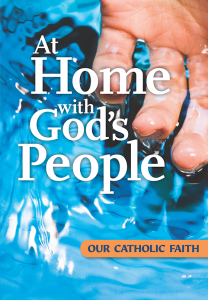WEBSITES
- Involving the Whole Parish in the RCIA
Liturgy Brisbane.

BOOKS
- Rite of Christian Initiation of Adults

Two editions published by St Pauls.
Ritual edition and paperback edition published to help celebrants, assisting ministers, sponsors, catechumens, and congregations. Every parish and RCIA team must have this book. - The Way of Faith: A Field Guide to the RCIA Process

Nick Wagner. Twenty-Third Publications.
This book provides a clear and simple guide for parishes and teams.
LINKS
AUDIO VISUAL
- Adult Baptism Exploring Its Meaning (DVD)

Fr Thomas Richstatter OFM. St Anthony Messenger Press.
Examines the imagery surrounding the Sacrament of Baptism as celebrated during the initiation of adults and older children into the Catholic Church during the Easter Vigil. - Come to the Water (DVD)

USCCB.
Seattle is the setting for this detailed overview of the RCIA. With commentary from pastors, team leaders and members, and catechumens, this is a program that will provide useful material for any parish wishing to reflect on how it does the RCIA. It emphasises that the RCIA is a process not a programme. It looks at the Rite of Acceptance, the 'Dismissals', the Rite of the Elect, the Period of Purification and Enlightenment, the Scrutinies, the Easter Vigil celebration and the Mystagogia. Accompanied by a Study Guide. - Forming RCIA Sponsors. Catholic Update (DVD)
(set of 3, 10 sessions) Franciscan Media.
Franciscan Media.
This video companion to 'Handing on the Faith: When You Are an RCIA Sponsor' is an excellent tool to help you recruit and train sponsors for the RCIA process. Author Rita Burns Senseman talks about the ministry of the sponsor in the RCIA, and real-life sponsors and catechumens share their personal stories about their roles and relationships within the RCIA. Includes a music video, ‘Sponsor's Prayer’.
WHAT IS THE RCIA?
Before the reforms of the second Vatican Council, adults were initiated into the Catholic Church after a period of private “convert instruction” by a priest. Those who had not been previously baptised (and sometimes even those who had been baptised in another Church but whose baptism was considered invalid) were baptised in private, using the same ritual used for infants. They were confirmed and received communion at a usual Sunday Mass with little, if any, special ceremony to mark the significance of the occasion.
The revision of the sacrament of baptism was one of the most extensive and intensive undertakings after the Vatican Council. The RCIA (Rite of Christian Initiation of Adults) can perhaps best be described as a journey of faith which passes through a number of different phases or periods; progression into the next phase of the journey is always marked by the celebration of a liturgical rite. For example, those who are called to enter into the Period of the Catechumenate after the initial Inquiry phase celebrate a public ritual termed the Rite of Acceptance into the Order of Catechumens, often called the Rite of Welcoming.
The RCIA places the focus on Jesus in a much more explicit way than earlier rites of initiation. Adult conversion is not so much a conversion to belief in God as to a belief in the mystery of Jesus. For example, in the final period of Purification and Enlightenment the elect exchange “Satan’s crushing yoke” for “the gentle yoke of Jesus” (Exorcism, First Scrutiny) and have their spirits filled by Christ the Redeemer (RCIA 130). The prayers for each of the stages repeat phrases about “following Christ”, “knowing Christ” and “being conformed to Christ”.
The Rite explains that, from the moment someone is received into the catechumenate, he or she becomes part of the Catholic Christian community. It expresses this in warm images of family intimacy: “From this time on the Church embraces the catechumens as its own with a mother’s love and concern” (RCIA 47).
It is important to be clear on the purpose of the catechumenate. It is not primarily aimed at “making more Catholics” to fill up some of the empty seats in our churches. The first paragraph of the RCIA outlines clearly its vision that adults might “…enter the way of faith and conversion as the Holy Spirit opens their hearts”. The chief purpose is conversion of heart and mind to Christ. During the catechumenate period, candidates come to ever deepening faith in Jesus. In baptism they become incorporated into Christ and into the Church.

